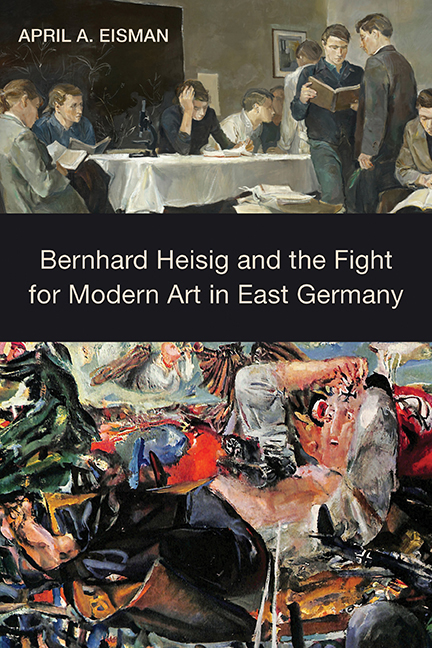Book contents
- Frontmatter
- Contents
- List of Illustrations
- Acknowledgments
- List of Abbreviations
- Introduction: Why Heisig Matters
- 1 From the Nazi Past to the Cold War Present
- 2 Art for an Educated Nation
- 3 Against the Wall: Murals, Modern Art, and Controversy
- 4 The Contentious Emergence of the “Leipzig School”
- 5 Portraying Workers and Revolutionaries
- Conclusion: The Quintessential German Artist
- Notes
- Bibliography
- Index
3 - Against the Wall: Murals, Modern Art, and Controversy
Published online by Cambridge University Press: 14 June 2019
- Frontmatter
- Contents
- List of Illustrations
- Acknowledgments
- List of Abbreviations
- Introduction: Why Heisig Matters
- 1 From the Nazi Past to the Cold War Present
- 2 Art for an Educated Nation
- 3 Against the Wall: Murals, Modern Art, and Controversy
- 4 The Contentious Emergence of the “Leipzig School”
- 5 Portraying Workers and Revolutionaries
- Conclusion: The Quintessential German Artist
- Notes
- Bibliography
- Index
Summary
Heisig turned in sketches for three murals for the Hotel Deutschland in July 1964, just a few weeks after his self-criticism. Although overlooked in current scholarship, murals formed an important part of Heisig's oeuvre in the Ulbricht era (1949–71), a time when the East German government promoted the creation of large-scale public works as a particularly Socialist medium. Embraced by politicians and artists alike, murals were seen as a socially engaged art form that was well suited for reaching the people. In the 1950s and especially 1960s, Heisig created more than ten murals, many of which—such as those for the Hotel Deutschland—can still be found in their original locations. The number and type of works he created, which included plaster and sgraffito, suggest he was interested in exploring new media. Indeed, it was his experiences making murals—a medium that denies the illusionism possible in oil painting—that I believe contributed, ultimately, to his development of a modern painting style.
In addition to encouraging the shift in Heisig's painting style, the Hotel Deutschland murals—which demonstrated a playful use of form and color that was new to Heisig's oeuvre—also sparked a vehement controversy, Heisig's second in less than a year. In February 1965, shortly after the murals were finished, Alfred Kurella, a powerful figure in East German cultural politics, wrote a five-page report titled “Thoughts about the Murals in the ‘Hotel Deutschland’ (Leipzig).” In it, he criticized all of the murals created for the new building, including those by Wolfgang and Ursula Mattheuer and Hans Engels, but it was Heisig's murals that elicited his sharpest criticisms: “[These murals show] the most serious demonstration against our view of art…. Here is the principle of intentional deformation, mutilation and uglification of reality and the use and frequent mixing together of single deformed fragments of pieces of reality carried too far.”
Kurella's report sparked a flurry of activity. In less than a week, all the organizations associated with the commission filed their own reports explaining their role in the creation of the murals and their evaluation of them.
- Type
- Chapter
- Information
- Bernhard Heisig and the Fight for Modern Art in East Germany , pp. 81 - 105Publisher: Boydell & BrewerPrint publication year: 2018
- 1
- Cited by



